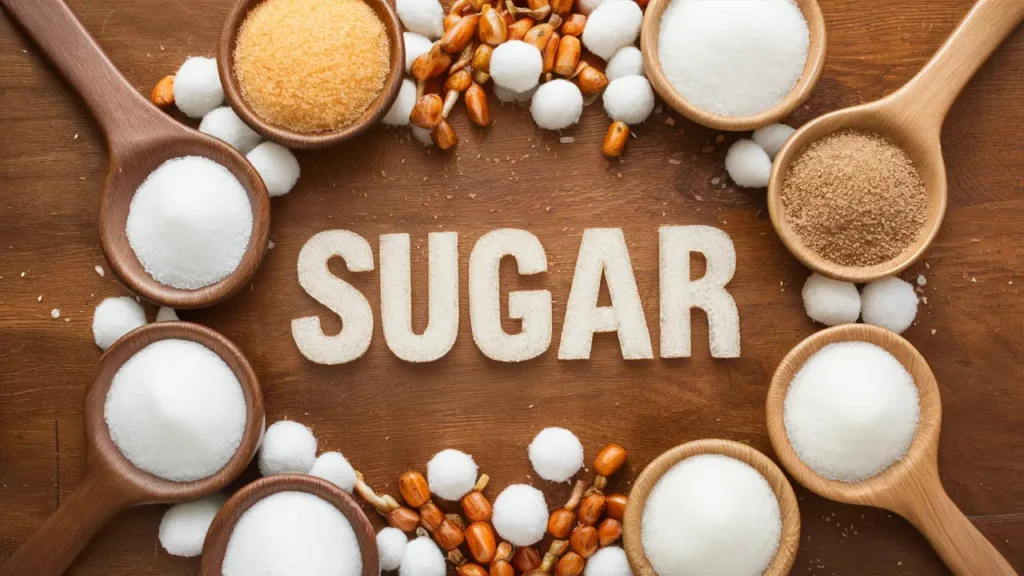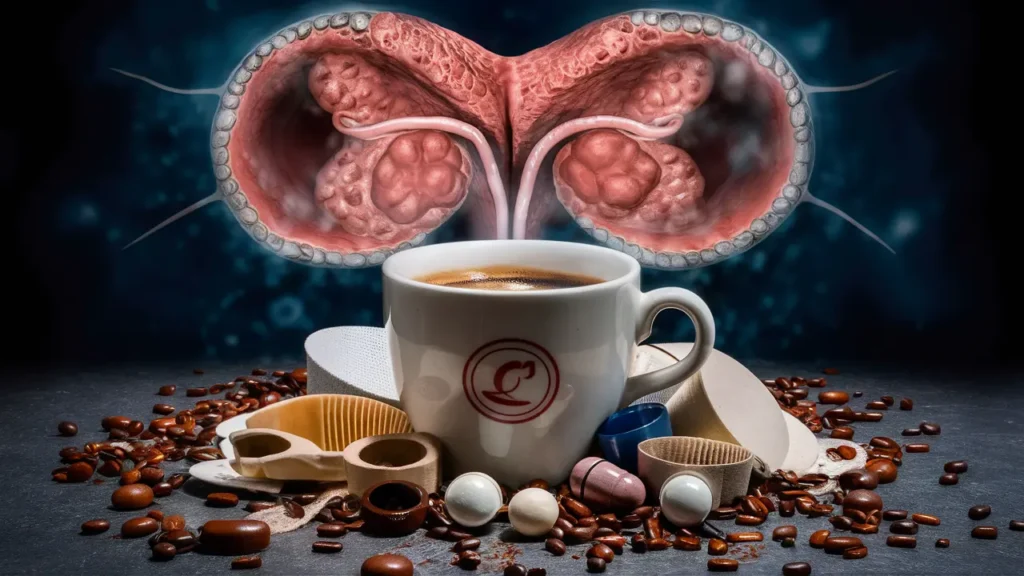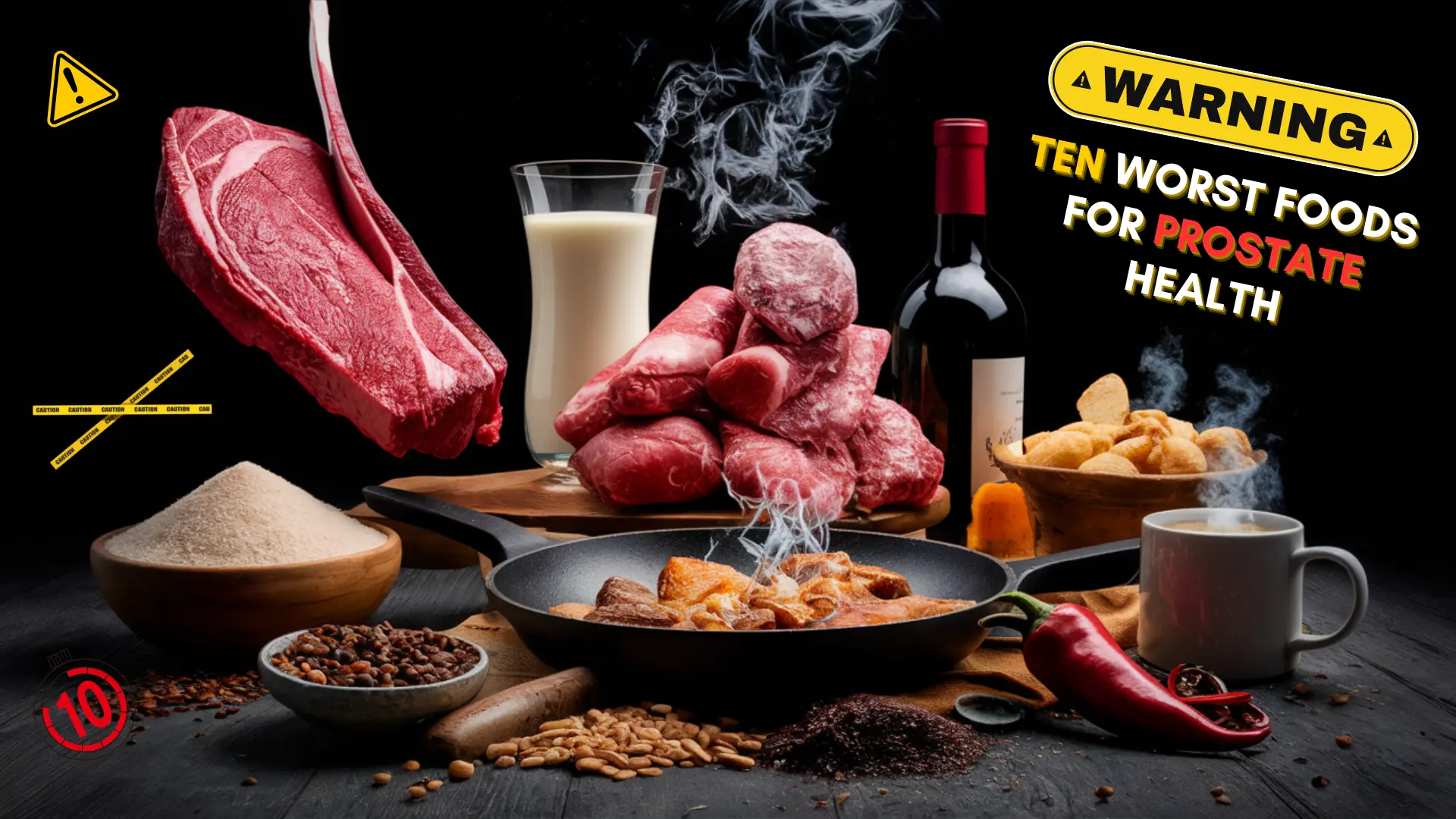Discover the ten worst foods for prostate health and learn crucial diet tips for men. Boost your prostate wellness with expert advice on nutrition and lifestyle changes.
Contents
- 1 Introduction
- 2 Understanding Prostate Health: Key Factors and Risks
- 3 The Link Between Diet and Prostate Health
- 4 Top 10 Foods to Avoid for Optimal Prostate Health
- 4.1 1. Red Meat: A Potential Prostate Cancer Risk
- 4.2 2. Dairy Products: High-Fat Milk and Prostate Concerns
- 4.3 3. Processed Meats: Nitrates and Prostate Health
- 4.4 4. Fried Foods: Trans Fats and Prostate Inflammation
- 4.5 5. Refined Sugar: Blood Sugar Spikes and Prostate Issues
- 4.6 6. Alcohol: Excessive Consumption and Prostate Problems
- 4.7 7. Saturated Fats: Prostate Cancer Growth and Progression
- 4.8 8. Caffeine: Urinary Symptoms and Prostate Irritation
- 4.9 9. Spicy Foods: BPH Symptoms and Prostate Discomfort
- 4.10 10. High-Sodium Foods: Blood Pressure and Prostate Health
- 5 Healthier Alternatives: Foods That Support Prostate Health
- 6 Lifestyle Changes to Complement a Prostate-Friendly Diet
- 7 When to Consult a Urologist: Warning Signs and Screening
- 8 Conclusion:
- 9 FAQs: Common Questions About Diet and Prostate Health
Introduction
Prostate health is a cornerstone of men’s overall well-being, yet it’s often overlooked until problems arise. As men age, the risk of prostate-related issues increases significantly, making it crucial to understand how lifestyle choices, particularly diet, can impact this vital gland. In this comprehensive guide, we’ll delve deep into the ten worst foods for prostate health, providing you with essential information to protect and maintain your prostate function.
The prostate gland plays a critical role in male reproductive health, producing seminal fluid that nourishes and transports sperm. However, its location surrounding the urethra makes it susceptible to various conditions that can affect urinary and sexual function. By the age of 60, nearly half of all men will have experienced some form of prostate issue, highlighting the importance of proactive care.
Understanding Prostate Health: Key Factors and Risks
The prostate, a small gland about the size of a walnut, is located just below the bladder and in front of the rectum. Its primary function is to produce seminal fluid, but it also plays a role in hormone production and urine control. As men age, they become more susceptible to various prostate conditions, including:
- Benign Prostatic Hyperplasia (BPH): A non-cancerous enlargement of the prostate that can cause urinary symptoms.
- Prostatitis: Inflammation of the prostate gland, which can be acute or chronic.
- Prostate Cancer: The second most common cancer in men worldwide.
Several factors influence prostate health:
- Age: The risk of prostate issues increases significantly after age 50.
- Genetics: Family history can play a role in prostate cancer risk.
- Ethnicity: African American men have a higher risk of prostate cancer.
- Lifestyle choices: Diet, exercise, and other habits can impact prostate health.
- Hormones: Testosterone and its byproducts can influence prostate growth.
- Environmental factors: Exposure to certain chemicals or pollutants may increase risk.
Understanding these factors is the first step in taking control of your prostate health. By recognizing the risks, you can make informed decisions about your lifestyle and healthcare choices.
The Link Between Diet and Prostate Health
Research has consistently shown a strong correlation between diet and prostate health. What you eat can either support or hinder your prostate function, influencing factors such as inflammation, hormone levels, and cellular health.
Key dietary factors that impact prostate health include:
- Antioxidants: Foods rich in antioxidants can help protect prostate cells from damage.
- Phytonutrients: Certain plant compounds have been shown to have protective effects on the prostate.
- Omega-3 fatty acids: These healthy fats can help reduce inflammation in the prostate.
- Zinc: This mineral is crucial for prostate health and is found in high concentrations in the prostate gland.
- Saturated and trans fats: Excessive consumption of these fats may increase prostate cancer risk.
- Calcium: While important for overall health, very high calcium intake has been linked to increased prostate cancer risk.
By being mindful of your diet, you can significantly reduce your risk of prostate problems and potentially slow the progression of existing conditions. Let’s explore in detail the foods that may negatively impact prostate health.
Top 10 Foods to Avoid for Optimal Prostate Health
1. Red Meat: A Potential Prostate Cancer Risk

Excessive consumption of red meat, especially when cooked at high temperatures, has been linked to an increased risk of prostate cancer. The high content of saturated fats and potential carcinogens formed during cooking contribute to this risk.
Why it’s harmful:
- High in saturated fats, which may promote inflammation
- Contains heme iron, which can generate free radicals
- Cooking at high temperatures can produce carcinogenic compounds like heterocyclic amines (HCAs) and polycyclic aromatic hydrocarbons (PAHs)
Research insights:
A study published in the Journal of the National Cancer Institute found that men who consumed the most red meat had a 12% higher risk of prostate cancer compared to those who consumed the least.
Key points:
- Limit red meat intake to no more than 2-3 servings per week
- Choose leaner cuts when consuming red meat (e.g., sirloin, flank steak)
- Opt for healthier cooking methods like grilling at lower temperatures, roasting, or slow-cooking
- Marinate meat before cooking to reduce the formation of harmful compounds
- Consider replacing some red meat meals with fish, poultry, or plant-based proteins
2. Dairy Products: High-Fat Milk and Prostate Concerns

While dairy can be part of a healthy diet, high-fat dairy products have been associated with an increased risk of prostate cancer. The exact mechanism is not fully understood, but it may be related to the hormones present in milk or the impact of calcium on vitamin D metabolism.
Why it’s harmful:
- High in saturated fats
- Contains growth factors that may promote cancer cell proliferation
- High calcium content may interfere with vitamin D metabolism
Research insights:
A large-scale study published in the American Journal of Clinical Nutrition found that men who consumed three or more servings of dairy products a day had a 141% higher risk of death due to prostate cancer compared to those who consumed less than one serving.
Key points:
- Choose low-fat or fat-free dairy options when possible
- Consider plant-based milk alternatives like almond, soy, or oat milk
- Moderate your overall dairy intake, aiming for no more than 2 servings per day
- If using dairy, opt for fermented products like yogurt or kefir, which may have protective effects
- Ensure adequate vitamin D intake through other sources or supplements, as advised by your healthcare provider.
3. Processed Meats: Nitrates and Prostate Health

Processed meats like bacon, sausages, and deli meats contain nitrates and other preservatives that may contribute to prostate cancer risk. These foods are often high in saturated fats and sodium, which can also negatively impact overall health.
Why it’s harmful:
- Contains nitrates and nitrites, which can form carcinogenic N-nitroso compounds
- High in saturated fats and sodium
- Often cooked at high temperatures, producing harmful compounds
Research insights:
A study published in the journal Cancer Prevention Research found that men who consumed the most processed meat had a 4% higher risk of prostate cancer compared to those who consumed the least.
Key points:
- Limit or avoid processed meats in your diet
- Choose fresh, unprocessed meats when possible
- Explore plant-based protein alternatives like legumes, tofu, or tempeh
- If consuming processed meats, look for nitrate-free options
- Balance occasional processed meat consumption with plenty of fruits and vegetables rich in antioxidants
4. Fried Foods: Trans Fats and Prostate Inflammation

Fried foods, especially those from fast-food restaurants, are often high in trans fats. These unhealthy fats can promote inflammation throughout the body, including the prostate gland, potentially exacerbating existing prostate conditions.
Why it’s harmful:
- High in trans fats, which promote inflammation
- Often cooked in oils that become rancid at high temperatures
- May contain acrylamide, a potential carcinogen formed during high-temperature cooking
Research insights:
A study published in The Prostate journal found that men with prostate cancer who consumed more deep-fried foods had a higher risk of aggressive prostate cancer.
Key points:
- Minimize consumption of fried foods, especially those from fast-food chains
- Opt for baked, grilled, or air-fried alternatives
- When cooking at home, use healthier oils like olive oil and avoid reusing oil
- Read food labels to avoid hidden trans fats in packaged foods
- Increase intake of anti-inflammatory foods like fatty fish, nuts, and leafy greens
5. Refined Sugar: Blood Sugar Spikes and Prostate Issues

High sugar intake can lead to rapid spikes in blood sugar levels, which may contribute to prostate inflammation and potentially increase the risk of prostate cancer. Sugary foods also often lack essential nutrients beneficial for prostate health.
Why it’s harmful:
- Causes insulin spikes, which may promote cancer cell growth
- Contributes to obesity, a risk factor for aggressive prostate cancer
- Often replaces more nutritious foods in the diet
Research insights:
A study in the International Journal of Cancer found that men with high blood sugar levels had a 26% higher risk of prostate cancer compared to those with lower levels.
Key points:
- Reduce intake of sugary snacks, desserts, and beverages
- Choose natural sweeteners like stevia or monk fruit in moderation
- Opt for whole fruits instead of fruit juices to benefit from fiber
- Be aware of hidden sugars in processed foods and condiments
- Balance carbohydrate intake with protein and healthy fats to stabilize blood sugar
6. Alcohol: Excessive Consumption and Prostate Problems

While moderate alcohol consumption may have some health benefits, excessive drinking can negatively impact prostate health. Alcohol can irritate the prostate and potentially increase the risk of prostate cancer.
Why it’s harmful:
- Can increase levels of harmful hormones like dihydrotestosterone (DHT)
- May interfere with the body’s ability to regulate cell growth
- Can lead to nutrient deficiencies that impact prostate health
- Contributes to overall inflammation in the body
Research insights:
A meta-analysis published in BMC Cancer found that heavy alcohol consumption was associated with a 20% increased risk of prostate cancer.
Key points:
- Limit alcohol intake to no more than 1-2 drinks per day
- Choose red wine for its potential antioxidant benefits (resveratrol)
- Stay hydrated by alternating alcoholic drinks with water
- Be aware of the calorie content in alcoholic beverages
- If you don’t drink, don’t start for potential health benefits
7. Saturated Fats: Prostate Cancer Growth and Progression

Diets high in saturated fats have been linked to an increased risk of prostate cancer and may contribute to its progression. These fats are commonly found in animal products and some processed foods.
Why it’s harmful:
- May increase inflammation in the body
- Can lead to obesity, a risk factor for aggressive prostate cancer
- May alter hormone levels, potentially promoting cancer growth
Research insights:
A study in the journal Prostate Cancer and Prostatic Diseases found that men who consumed the most saturated fat had a 51% higher risk of prostate cancer death compared to those who consumed the least.
Key points:
- Reduce intake of fatty meats, full-fat dairy products, and tropical oils
- Choose lean proteins like fish, poultry, and plant-based options
- Opt for healthier fats from sources like avocados, nuts, and olive oil
- Read food labels to identify hidden sources of saturated fats in processed foods
- Cook with methods that don’t require added fats, such as steaming or baking
8. Caffeine: Urinary Symptoms and Prostate Irritation

While caffeine itself may not directly cause prostate problems, excessive consumption can exacerbate urinary symptoms associated with prostate conditions like BPH. Caffeine acts as a diuretic and can irritate the bladder.
Why it’s concerning:
- Acts as a diuretic, increasing urinary frequency
- Can irritate the bladder, worsening BPH symptoms
- May increase anxiety, which can tense pelvic floor muscles
Research insights:
A study in the American Journal of Epidemiology found that men who consumed the most caffeine had a 72% higher likelihood of having moderate to severe urinary symptoms compared to those who consumed the least.
Key points:
- Moderate caffeine intake, especially in the evening
- Choose decaf options when possible, particularly after midday
- Stay hydrated with water throughout the day
- Be aware of hidden caffeine sources like chocolate and some medications
- If you have BPH, monitor how caffeine affects your symptoms and adjust accordingly.
9. Spicy Foods: BPH Symptoms and Prostate Discomfort

For men with existing prostate conditions like BPH, spicy foods can irritate the prostate and bladder, potentially worsening urinary symptoms. While not a direct cause of prostate problems, they may contribute to discomfort.
Why it’s concerning:
- Can irritate the bladder and urethra
- May increase inflammation in the prostate area
- Can exacerbate symptoms of prostatitis.
Research insights:
While specific studies on spicy foods and prostate health are limited, many urologists report that patients with prostate conditions often experience symptom flare-ups after consuming spicy foods.
Key points:
- Reduce intake of spicy foods if experiencing prostate symptoms
- Experiment with milder spices and herbs for flavor
- Pay attention to how your body reacts to different spices and keep a food diary
- Consider anti-inflammatory spices like turmeric as alternatives
- If you enjoy spicy foods, balance them with cooling foods like cucumber or yogurt
10. High-Sodium Foods: Blood Pressure and Prostate Health

Excessive sodium intake can lead to high blood pressure, which may indirectly affect prostate health. High blood pressure can contribute to inflammation throughout the body, potentially impacting the prostate gland.
Why it’s harmful:
- Can lead to high blood pressure, a risk factor for prostate issues
- May increase calcium excretion, affecting prostate health
- Often found in processed foods that lack beneficial nutrients.
Research insights:
A study published in the American Journal of Clinical Nutrition found that high sodium intake was associated with an increased risk of prostate cancer.
Key points:
- Limit processed and packaged foods high in sodium
- Use herbs and spices instead of salt for flavoring
- Read food labels to identify hidden sources of sodium
- Aim for no more than 2,300 mg of sodium per day (or less if advised by your doctor)
- Increase intake of potassium-rich foods to help balance sodium levels.
Healthier Alternatives: Foods That Support Prostate Health
While avoiding harmful foods is crucial, incorporating prostate-friendly options into your diet can provide additional benefits:
1. Tomatoes: Rich in lycopene, a powerful antioxidant linked to reduced prostate cancer risk. Cooked tomatoes and tomato products like sauce or paste offer more bioavailable lycopene.
2. Cruciferous vegetables: Broccoli, cauliflower, Brussels sprouts, and kale contain sulforaphane, which may help prevent prostate cancer cell growth.
3. Fatty fish: Salmon, mackerel, and sardines are high in omega-3 fatty acids, which can help reduce inflammation in the prostate.
4. Green tea: Contains catechins, particularly EGCG, which have been shown to have anti-cancer properties.
5. Pomegranate: Rich in antioxidants that may slow prostate cancer cell growth and lower PSA levels.
6. Berries: Strawberries, blueberries, and raspberries are packed with antioxidants and vitamin C, supporting overall prostate health.
7. Nuts and seeds: Particularly pumpkin seeds and Brazil nuts, which are high in zinc and selenium, important minerals for prostate health.
8. Whole grains: Provide fiber and nutrients that support overall health and may help reduce prostate cancer risk.
9. Garlic and onions: Contain allicin, which has anti-inflammatory and potential anti-cancer properties.
10. Legumes: High in fiber and plant-based protein, which may help reduce prostate cancer risk.
These foods are rich in antioxidants, anti-inflammatory compounds, and essential nutrients that support overall prostate health. Aim to incorporate a variety of these foods into your diet regularly.
Lifestyle Changes to Complement a Prostate-Friendly Diet
In addition to dietary changes, consider implementing these lifestyle modifications to further support prostate health:
1. Regular exercise: Aim for at least 150 minutes of moderate activity or 75 minutes of vigorous activity per week. Exercise can help maintain a healthy weight, reduce inflammation, and improve overall prostate health.
2. Maintain a healthy weight: Obesity is a risk factor for aggressive prostate cancer. Losing excess weight can significantly improve prostate health.
3. Manage stress: Chronic stress can contribute to inflammation and hormonal imbalances. Practice stress-reduction techniques like meditation, yoga, or deep breathing exercises.
4. Get adequate sleep: Aim for 7-9 hours of quality sleep per night. Poor sleep has been linked to increased inflammation and hormonal imbalances that may affect prostate health.
5. Stay hydrated: Drink plenty of water throughout the day. Proper hydration helps flush toxins from the body and supports overall urinary health.
6. Quit smoking: Smoking has been linked to more aggressive forms of prostate cancer. Quitting can significantly reduce your risk and improve overall health.
7. Limit alcohol consumption: If you drink, do so in moderation. Excessive alcohol intake can negatively impact prostate health and overall well-being.
8. Practice pelvic floor exercises: Kegel exercises can help strengthen the muscles that support the prostate and improve urinary control.
9. Maintain sexual health: Regular ejaculation may help reduce the risk of prostate cancer, according to some studies.
10. Reduce exposure to environmental toxins: Minimize contact with pesticides, herbicides, and industrial chemicals that may have hormonal effects.
These lifestyle changes, combined with a prostate-friendly diet, can significantly improve your overall prostate health and reduce the risk of related issues. Remember, consistency is key – small, sustainable changes over time can lead to significant improvements in your health.
When to Consult a Urologist: Warning Signs and Screening

While diet and lifestyle play crucial roles in prostate health, it’s essential to be aware of warning signs that may require medical attention. Don’t hesitate to consult a urologist if you experience any of the following symptoms:
- Frequent urination, especially at night (nocturia)
- Weak urine stream or difficulty starting urination
- nability to urinate or difficulty emptying the bladder completely
- Blood in urine or semen
- Erectile dysfunction that doesn’t respond to lifestyle changes
- Pain or discomfort in the pelvic area, genitals, or lower back
- Painful ejaculation
- Unexplained weight loss or fatigue.
Regular prostate screenings are crucial for early detection and management of prostate issues. The American Cancer Society recommends:
- Men at average risk should start discussing prostate cancer screening with their doctor at age 50.
- African American men and those with a family history of prostate cancer should start discussions at age 45.
- Men with more than one first-degree relative diagnosed with prostate cancer at an early age should start discussions at age 40.
Screening typically involves:
- PSA (Prostate-Specific Antigen) test: A blood test that measures PSA levels, which can be elevated in cases of prostate cancer, BPH, or prostatitis.
- Digital Rectal Exam (DRE): A physical examination where the doctor checks the prostate for any abnormalities in size, shape, or texture.
Remember, these screenings are not definitive diagnoses but can indicate the need for further testing. Always consult with your healthcare provider to determine the appropriate screening schedule based on your individual risk factors and health history.
Conclusion:
By understanding the ten worst foods for prostate health and making informed dietary choices, you can significantly reduce your risk of prostate-related issues. Remember that a holistic approach, combining a healthy diet with lifestyle modifications and regular check-ups, is key to maintaining optimal prostate health.
Taking charge of your prostate health doesn’t mean completely eliminating all potentially harmful foods or living in fear of prostate issues. Instead, it’s about making informed choices, finding a balance that works for you, and being proactive about your health. Here are some key takeaways:
- Moderation is key: While it’s important to limit foods that may harm prostate health, occasional indulgences are okay. Focus on overall dietary patterns rather than individual foods.
- Embrace variety: A diverse diet rich in fruits, vegetables, whole grains, and lean proteins provides a wide range of nutrients that support prostate and overall health.
- Stay informed: Keep up with the latest research on prostate health, but always consult with healthcare professionals before making significant changes to your diet or lifestyle.
- Listen to your body: Pay attention to how different foods and lifestyle factors affect you. Everyone’s body is different, and what works for one person may not work for another.
- Be proactive: Don’t wait for symptoms to appear before taking action. Preventive measures, including regular check-ups and screenings, can catch issues early when they’re most treatable.
- Encourage others: Share your knowledge with friends and family. Prostate health is an important topic that deserves more attention and open discussion.
By implementing these dietary guidelines, making positive lifestyle changes, and staying informed about your prostate health, you’re taking significant steps towards a healthier future. Remember, it’s never too early or too late to start prioritizing your prostate health. Your future self will thank you for the proactive steps you’re taking now.
FAQs: Common Questions About Diet and Prostate Health
Q: Can dietary changes reverse existing prostate conditions?
A: While diet alone may not reverse existing conditions, it can help manage symptoms and potentially slow progression. A healthy diet can also support overall prostate health and may complement medical treatments. Always consult with your healthcare provider for personalized advice on managing prostate conditions.
Q: Are there any supplements that can improve prostate health?
A: Some supplements, like saw palmetto, beta-sitosterol, and pygeum, have shown potential benefits for prostate health, particularly for BPH symptoms. However, the evidence is mixed, and supplements can interact with medications. It’s essential to consult with a healthcare professional before starting any supplement regimen.
Q: How soon can I expect to see improvements after changing my diet?
A: The timeline for improvements can vary depending on the individual and the specific condition. Some men report noticing positive changes in urinary symptoms within a few weeks to months of adopting a prostate-friendly diet. However, long-term dietary changes are most beneficial for overall prostate health.
Q: Is it necessary to completely eliminate all the “worst foods” from my diet?
A: While it’s best to limit these foods, complete elimination may not be necessary or realistic for everyone. Focus on moderation and balance, prioritizing healthier alternatives most of the time. The key is to reduce overall consumption of potentially harmful foods while increasing intake of prostate-friendly options.
Q: Can prostate-friendly foods benefit overall health as well?
A: Absolutely! Many foods that support prostate health are also beneficial for heart health, weight management, and overall well-being. A diet rich in fruits, vegetables, whole grains, and lean proteins provides numerous health benefits beyond prostate health.
Remember, maintaining prostate health is an ongoing process. By staying informed and making conscious dietary and lifestyle choices, you’re taking important steps towards a healthier future. Always consult with healthcare professionals for personalized advice and regular check-ups to ensure optimal prostate health.
